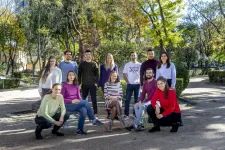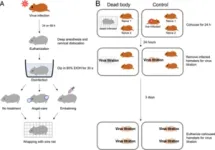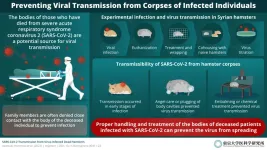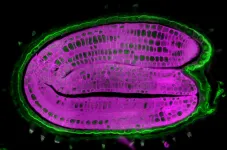(Press-News.org) The study supports the therapeutic benefit of this drug in postmenopausal patients with hormone-receptor negative breast tumours and RANK protein expression.
"These results revive the option of starting clinical trials of denosumab in breast cancer by selecting patients," says Eva González-Suarez, CNIO researcher and lead author.
The results are published today in the scientific journal EMBO Molecular Medicine.
The drug denosumab is currently used to treat osteoporosis and bone metastases. For more than a decade, its potential therapeutic benefit in the treatment of breast cancer has also been studied. However, due to conflicting clinical data, the survival benefit in breast cancer patients is unclear.
With the aim of selecting patients who could benefit from this drug, researchers from the Spanish National Cancer Research Centre (CNIO) and the Bellvitge Biomedical Research Institute (IDIBELL), led by Eva González-Suárez, have analysed the expression of the RANK protein and its RANKL ligand in more than 2,000 breast tumours, including 777 without hormone receptor expression, from four independent cohorts.
Their results show that RANK protein expression is more frequent in tumours without hormone receptors, where it was associated with poor prognosis and poor response to chemotherapy. In addition, the researchers observed increased activation of the RANK pathway in breast tumours after menopause, suggesting that the use of the inhibitor denosumab, added to standard of care, may be of greater therapeutic value in postmenopausal patients with hormone receptor-negative breast tumours and RANK protein expression.
Tumours without hormone receptors, where the cancer cells lack oestrogen and progesterone receptors, have a worse prognosis and limited treatment options. "Given the heterogeneity of the group of hormone receptor -negative breast tumours, it is essential to have biomarkers that better distinguish the prognosis of these patients, especially if these markers allow us to choose the most appropriate treatment," says Eva González-Suárez, head of the Transformation and Metastasis Group at the CNIO.
"The reliability of the results is high," she adds. "They suggest that there is a group of patients who could benefit from treatment with denosumab and reactivate the option of starting breast cancer trials by selecting patients."
The next step would therefore be to "design a clinical trial in patients with hormone-receptor negative tumours expressing the RANK receptor and in pre- and post-menopausal patients."
RANK in different breast tumours
The RANK protein is located in the cell membrane and when it binds to RANKL, it sends key signals that allow the mammary gland to develop properly and produce milk. In previous studies, Gonzalez-Suarez et al. showed that inhibiting RANKL with drugs such as denosumab could be a way to prevent the disease.
Gonzalez-Suarez and her team then demonstrated that pharmacological inhibition of the RANK/RANKL pathway reduced recurrence and metastasis in mouse models of breast cancer. Subsequent steps have focused on further understanding this relationship between RANK and the different types of human breast tumours, given the great heterogeneity of the disease in patients.
The RANK protein was initially described for its role in immunity. It was later found to play a key role in bone metabolism: activation of the RANK pathway is essential for the differentiation and functionality of osteoclasts, the cells responsible for bone resorption, which is why the first therapeutic indication for denosumab is osteoporosis and bone metastasis. "This is the best known and most therapeutically exploited role of RANK," explains González-Suárez. "Subsequently, in my group, we have shown that it is also important in the development of the mammary gland: we observed that it acts as a mediator of progesterone, which is essential for its ability to produce milk, but also in the development of breast cancer. Let's say that in order to form a tumour, breast epithelial cells have to divide, but if you block RANK pathway that is the main mediator of that division, you can prevent breast cancer."
Over 2000 samples from four cohorts
In this new study, Marina Ciscar and Eva M. Trinidad, co-first authors of the study, teamed up to determine the therapeutic value of the pathway in breast cancer. Ciscar and other members of González-Suárez's team analysed these proteins in more than 2,000 breast tumour samples from four older cohorts, mainly from Emad Rakha's team at the University of Nottingham, where they have been following patients for two decades, and two Spanish cohorts, from the Bellvitge Biomedical Research Institute (IDIBELL) and the CNIO.
Ciscar and her collaborators found that 40% of hormone-negative tumours expressed the RANK receptor, and that this expression was associated with worse prognosis and survival.
Eva M. Trinidad used experimental mouse models in which she implanted a small fragment of human tumours in the same organ of origin. In these models, RANKL inhibition reduced tumour cell proliferation and plasticity, regulated tumour immunity and metabolism, and improved response to chemotherapy. The researchers concluded that the RANK pathway could serve as both a biomarker and a therapeutic target.
Background
"This work began in 2014, thanks to the support of the Susan G. Komen Breast Cancer Foundation of America, and has continued over the years supported by other funding sources, including national and European Research Council (ERC), and thanks to the teamwork of researchers from IDIBELL, CNIO and Nottingham among others.
"This research follows on from previous observations where we had already seen that the receptor is more frequently expressed in tumours without hormone receptors. In this work, the analysis is much more powerful and has allowed us to conclude that within tumours that do not have hormone receptors, the presence or absence of the RANK receptor is associated with the prognosis of the disease," explains González-Suárez.
Two large phase III clinical trials with the primary aim of preventing bone metastases also looked at whether denosumab could increase overall survival in women. The results were contradictory, but the fact is that "none of the trials looked at receptor expression in patients: when they say that denosumab does not improve survival, they have not looked at whether the tumour expresses the receptor or not, which is a fundamental point. As the results of one of the trials were negative, the door was somewhat closed to trials of denosumab in breast cancer. I think that this study reactivates the possibility of doing them again, with patient selection," the researcher concludes.
END
A terrestrial planet hovering between Mars and Jupiter would be able to push Earth out of the solar system and wipe out life on this planet, according to a UC Riverside experiment.
UCR astrophysicist Stephen Kane explained that his experiment was meant to address two notable gaps in planetary science.
The first is the gap in our solar system between the size of terrestrial and giant gas planets. The largest terrestrial planet is Earth, and the smallest gas giant is Neptune, which is four times wider and 17 times more massive than Earth. There is nothing in between.
“In other star ...
Their findings highlight that embalming or "angel care" can effectively prevent virus transmission, to allow family members to say goodbye
During the pandemic, COVID-19 control measures in several countries prevented family members from coming into contact with loved ones who died from the infection. This had an impact on cremation practices and caused emotional distress. Researchers from Japan have now shown that, while deceased SARS-CoV-2-infected individuals may be a potential source of the ...
Germination is a crucial stage in the life of a plant as it will leave the stage of seed resistant to various environmental constraints (climatic conditions, absence of nutritive elements, etc.) to become a seedling much more vulnerable. The survival of the young plant depends on the timing of this transition. It is therefore essential that this stage be finely controlled. A Swiss team, led by scientists from the University of Geneva (UNIGE), has discovered the internal thermometer of seeds that can delay or even block germination if temperatures are too high for the future seedling. This work could help optimize plant growth in a context of global warming. These results can be ...
A commonly used scientific method to analyze a tiny amount of DNA in early human embryos fails to accurately reflect gene edits, according to new research led by scientists at Oregon Health & Science University.
The study, published today in the journal Nature Communications, involved sequencing the genomes of early human embryos that had undergone genome editing using the gene-editing tool CRISPR. The work calls into question the accuracy of a DNA-reading procedure that relies on amplifying a small amount of DNA for purposes of genetic testing.
In addition, the study reveals that gene editing to correct disease-causing mutations in early human embryos can also lead to unintended ...
LOS ANGELES — Keck Medicine of USC has named Ikenna (Ike) Mmeje president and CEO of USC Arcadia Hospital (USC-AH), effective March 13.
In this position, Mmeje will further the health system’s mission to expand access to specialized health care and research to the San Gabriel Valley and beyond. He will oversee all management and operations of the hospital, including corporate compliance, strategic plan implementation and fundraising.
“Mmeje will utilize his wealth of knowledge and experience running complex, high-performing hospitals in his new role leading USC Arcadia Hospital,” said Rod Hanners, CEO of Keck Medicine.
Mmeje replaces current ...
Computer models are an important tool for studying how the brain makes and stores memories and other types of complex information. But creating such models is a tricky business. Somehow, a symphony of signals – both biochemical and electrical – and a tangle of connections between neurons and other cell types creates the hardware for memories to take hold. Yet because neuroscientists don’t fully understand the underlying biology of the brain, encoding the process into a computer model in order to study it further has been a challenge.
Now, ...
Plants convert light into a form of energy that they can use – a molecule called adenosine triphosphate (ATP) – through photosynthesis. This is a complex process that also produces sugar, which the plant can use for energy later, and oxygen. Some bacteria that live in the light-exposed layers of water sources can also convert light to ATP, but the process they use is simpler and less efficient than photosynthesis. Nonetheless, Technion - Israel Institute of Technology researchers now find this process isn’t as straightforward and limited as was previously thought.
Rhodopsins are the light-driven proton pumps ...
1. Commercial water purification system may have caused pathogen infection in 4 hospitalized patients
Abstract: https://www.acpjournals.org/doi/10.7326/M22-3306
URL goes live when the embargo lifts
A study of 4 cardiac surgery patients in one hospital found that they developed Mycobacterium abscessus infections, a multidrug-resistant nontuberculous mycobacteria, potentially due to a commercial water purifier. The water purifier had been installed in the hospital to improve water palatability but was inadvertently removing chlorine from the supply lines feeding ice and water machines in the affected area of ...
B. Hadley Wilson, MD, FACC, is the new president of the American College of Cardiology. Today marks the first day of his one-year term leading the global cardiovascular organization in its mission to transform cardiovascular care and improve heart health.
“Some of the best qualities of the ACC and its members are the commitment to patient care and the shared vision of a world where science, innovation and knowledge optimize and transform cardiovascular care and outcomes for all,” Wilson said. “I believe we all really practice what we preach. I am honored to lead an organization dedicated to innovating ...
Beginning today, Nicole L. Lohr, MD, PhD, FACC, will serve as chair of the American College of Cardiology Board of Governors (BOG) and secretary of the Board of Trustees. Her term will run one year from 2023-2024.
Lohr will lead governors from chapters representing all 50 states, the District of Columbia, Puerto Rico, Canada, Mexico and representatives from the U.S. health services. The BOG is the grassroots governing body of the ACC, a nonprofit cardiovascular medical society representing over 56,000 cardiologists and cardiovascular care team members around the world.
“I have spent the last 11 years finding ways to get involved in my ACC state chapter and in various ACC councils, ...






